Doctor of Medicine




Healthcare is changing. With an enhanced emphasis on health equity and a shift in focus from disease intervention to achieving wellness, there’s a growing recognition that people don’t get sick in a vacuum. Neighborhood, income, education — these all play a vital role in health that physicians must understand to care for the whole person.
Tomorrow’s physician must be equipped for success in navigating the systemic, societal causes of disease while delivering evidenced-based and up-to-date clinical diagnostics and therapeutics. We must render compassionate care while also maintaining our own wellness.
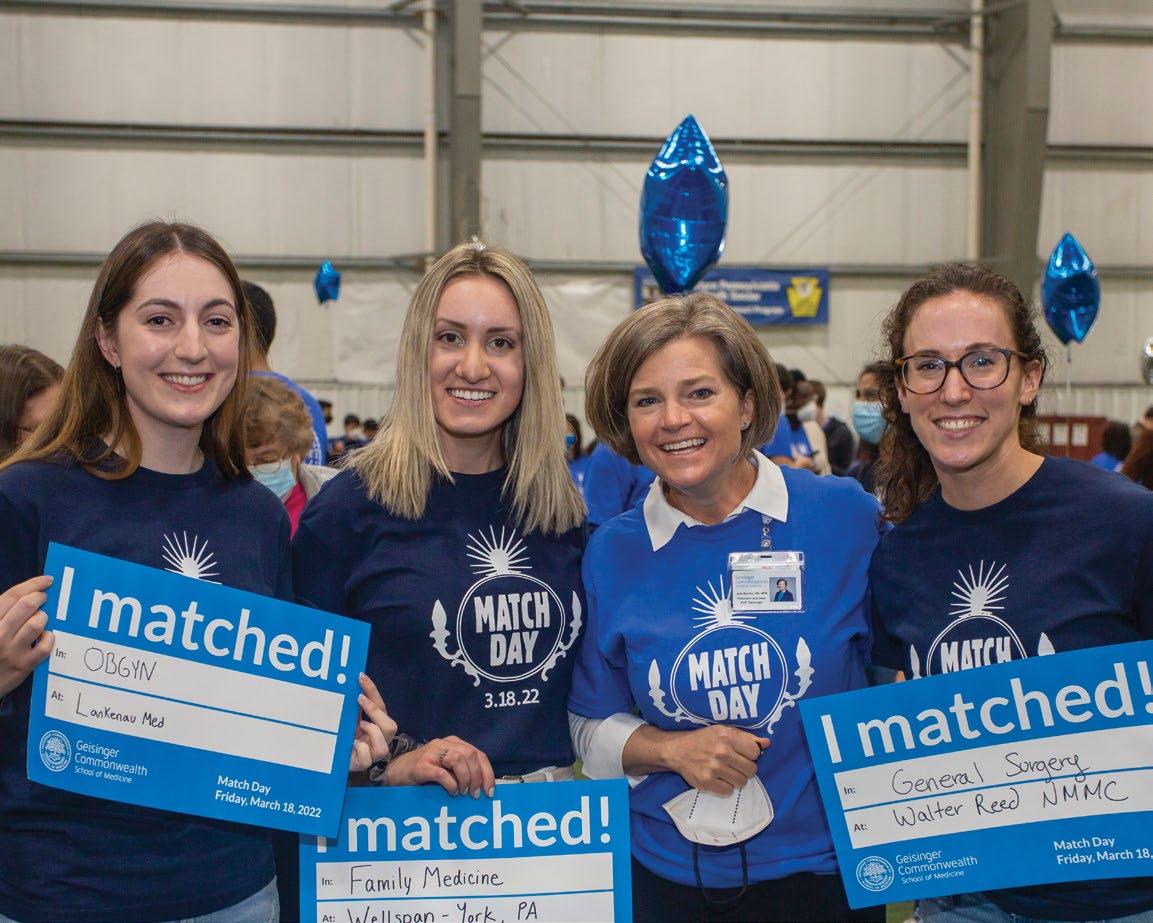
As a young school born of innovation and integrated with a health system that is a national model of excellence in person-centered care, Geisinger Commonwealth offers a distinct medical education. Leveraging Geisinger’s acclaimed clinical and technological strengths — including its international prominence in genetics and genomics — we emphasize active learning, early clinical exposure, and community immersion. That’s why Geisinger Commonwealth graduates are known for authentic empathy, in addition to residency-ready clinical skills. We educate the kind of doctors who will lead healthcare teams of the future. If this is the future physician you’d like to be, Geisinger Commonwealth is the place for you to learn.
Sincerely, Julie Byerley, MD, MPH
President and Dean, Geisinger Commonwealth School of Medicine Executive Vice President and Chief Academic Officer, Geisinger

The Total Health Curriculum is built on the science of learning and uses an evidence-based approach to train skilled, compassionate physicians who provide individualized care of patients and promote health in the communities they serve. In addition to providing a fully integrated and immersive educational experience in basic, clinical and health systems sciences, the curriculum emphasizes six themes, including Social Justice and Health Equity, Health System Citizenship, Primary Care, Personal and Professional Development, Community Immersion and Population Health. These themes will guide the training of physicians who are resilient, collaborative and ready to assume leadership roles in evolving healthcare settings.
At Geisinger Commonwealth, we envision our Total Health Curriculum as a tree, like the tree of knowledge that forms our seal. The roots correspond to Phase 1 – Principles of Science and Practice, which encompasses foundational education rooted in basic, clinical and health system sciences. The trunk epitomizes Phase 2 – Core Clinical Immersion. With roots firmly planted, you will build a solid body of clinical experiences that begins early and grows in complexity and meaning. The trunk provides firm support for the branches, which represent Phase 3 – Career Differentiation and Exploration You are now ready to branch off in your own direction. Following your core clinical experiences, you will progress in the development of advanced clinical skills and training that suits your individual interests and career goals.
Phase

Outpatient
Inpatient
Combined
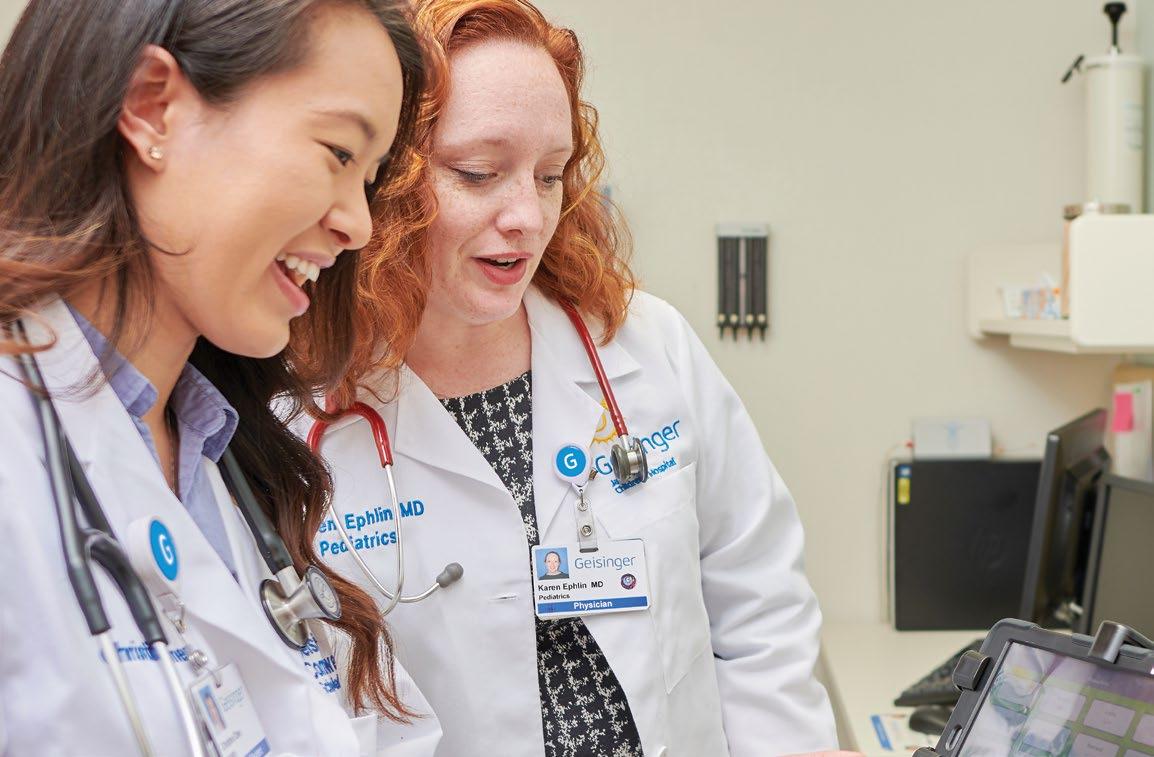

When Stephanie Delma was 6 years old, she experienced unimaginable trauma. Her mother became the victim of gun violence, shot in the hip and jaw in a failed criminal conspiracy to collect insurance money. “She was a single mom, my only guardian,” Stephanie said. “It was very scary. I talk about it a lot because of how much it shaped me.”
As her mother recovered, Ms. Delma felt less fear and more curiosity. “I distinctly remember one conversation I had with one of my mother’s doctors,” she said. “He told me, ‘We took bone from her hip and used it to fix her mouth.’ And I remember thinking, ‘Wow! You can do that with bones?’ That’s when I started telling people I wanted to be a ‘bone doctor.’ I thought it was fascinating that you can use parts of your body to repair other parts.”
Ms. Delma hasn’t strayed from that path she set herself on in the first grade. She double majored in biology and communications at Boston College and, because she devoted a great deal of time to the communications major, she went on to the Postbaccalaureate Program at Elms College in Chicopee, Mass., to complete the necessary
prerequisites for medical school. Elms posted a list of places where its graduates had been successful medical school applicants. One of the schools was Geisinger Commonwealth.
“The moment I stepped on Geisinger’s campus, I felt I was home,” she said. “I was thinking, ‘I hope they accept me.’ It was my favorite interview. Everybody was so kind and didn’t shy away from my questions about inclusivity. I asked, ‘How do you promote diversity?’ and I received a long list of activities — which I then got involved in as a student.”
Between her second and third years, Ms. Delma opted to take a gap year to do research and hone her residency application. “I was an upper extremity research fellow at Geisinger’s Musculoskeletal Institute with Dr. (Louis C.) Grandizio. It was awesome. I was also involved in resident didactic sessions and went to cadaver labs for shoulder and elbow replacements. I thought, ‘I’m not even a thirdyear and I am doing these things!’ It was the best experience I have had so far in my medical career and makes me want to stay here even more.”
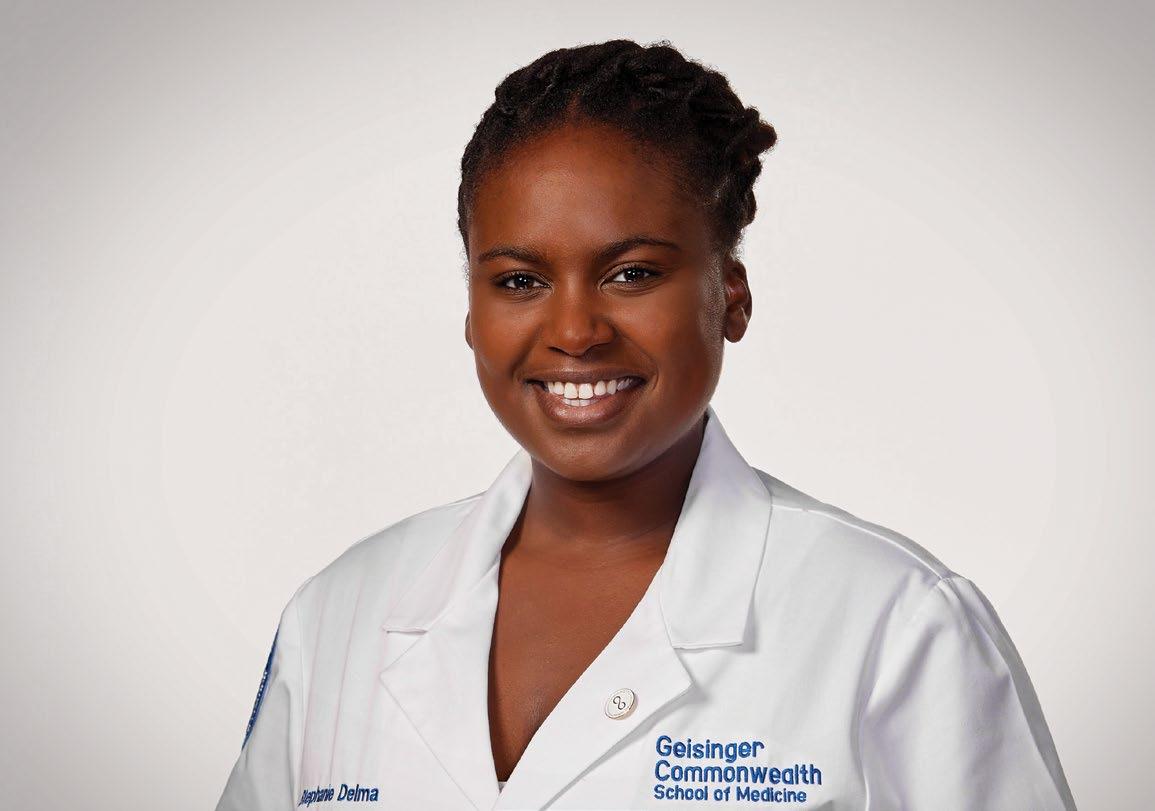
A strength of the Geisinger Commonwealth Total Health Curriculum is the integration of six longitudinal themes that transform responsible students into socially accountable leaders in the healthcare system and their communities. These themes foster the development of compassionate and adaptable physicians dedicated to a person-centered approach to improving the health and well-being of the patients and communities they serve.
1. Social Justice and Health Equity: Ensures awareness and recognition of historic inequities in medicine to establish the next generation of physicians as agents of change. Students will learn to recognize their own biases and practice cultural humility in their interaction with patients and colleagues.
2. Health System Citizenship: Prepares future doctors to contribute to quality improvement, participate in early adoption of technology and function in teambased models of care. This theme delves deeply into healthcare delivery science and leverages the strength of Geisinger’s value-based care model to focus on system improvement.
3. Primary Care: Focuses attention on the most critical health need in the nation and centers the future physician’s approach on wellness and disease prevention, regardless of medical specialty.

4. Personal and Professional Development: Supplies the tools, skills and knowledge necessary to promote lifelong learning and skill development, personal wellness and career development.
5. Community Immersion: Enables meaningful relationships with and accountability to the community. Students engage in service learning with mentorship by both community leaders and patients.
6. Population Health: Leverages Geisinger’s signature programs to introduce future physicians to successful models that recognize and mitigate the social determinants of health that affect individual patients, neighborhoods, communities and populations.
Justina Warnick grew up in a Geisinger family. Her father is a mechanic at Geisinger Wyoming Valley Medical Center, so she was cared for by Geisinger doctors since her birth. And her brother is an orthopaedic surgical intern at Geisinger Medical Center. Despite these close ties to healthcare, Ms. Warnick said her parents didn’t apply any special pressure when it came to her choice of career or of professional school. Instead, a novel project in high school served as her inspiration to pursue medicine.

“In ninth-grade algebra, I was required to compete an interdisciplinary project. I made a roller coaster called ‘Murder She Rode’ that reflected a parabolic equation and was surrounded by intricately detailed rooms of a crime. I had to use science and math, but also art,” she said. “I enjoyed the project because of the breadth of expertise it required in several disciplines, and I realized medicine was the same — scientific knowledge is critical, but so are communication, empathy and compassion.” Ms. Warnick chose a pre-med track at Dickinson College, where she decided primary care was her passion.
“During a course called ‘Spanish for the Health Professions,’ I completed service learning at a migrant healthcare clinic. I served as an interpreter and almost felt like I was a doctor, because I spoke directly to the patients. The patients were so grateful and the information we provided had so much impact. I felt that this is what I wanted to do with my career,” she said. Her decision to pursue medicine, and primary care, made Ms. Warnick’s choice of medical school an easy one.
At Geisinger Commonwealth, Ms. Warnick has continued to advocate for robust primary care. She was elected president of the Pediatric Outreach Group for Students (POGS) and organized an event where POGS members taught 73 fellow students how to administer vaccines, understand the pediatric vaccine schedule and combinations, navigate vaccine hesitancy conversations and manage vaccinations in immune-compromised patients.
Traditional medical education relies on teaching basic, clinical and health system science concepts; however, these concepts must be well integrated and appropriately framed in clinical context. The Phase 1 curriculum uses the Clinical Presentation Model to integrate all content within the context of a clinical presentation. A clinical presentation is the mode by which a patient presents to a physician and represents the clinical problem a physician is expected to manage.
Big picture: The curriculum begins and ends with a focus on the patient, specifically the patient’s clinical presentation.
Deconstruct and independent learning: Each clinical presentation is broken down into its basic, clinical and health system science content and students will use resources in our knowledge repository to focus on learning objectives in preparation for in-class work.
Experiencing: Large and small group active learning activities are designed to have students apply knowledge in a clinical context.
Reassemble big picture: For each clinical presentation, student groups will summarize material for their classmates, re-integrating all content in a large group interactive session.

Geisinger Commonwealth offers a communitybased model of medical education with six regional campuses: Central (Danville), Guthrie (Sayre), North (Scranton), South (Wilkes-Barre), West (Lewistown) and AtlantiCare (Atlantic City, N.J.).
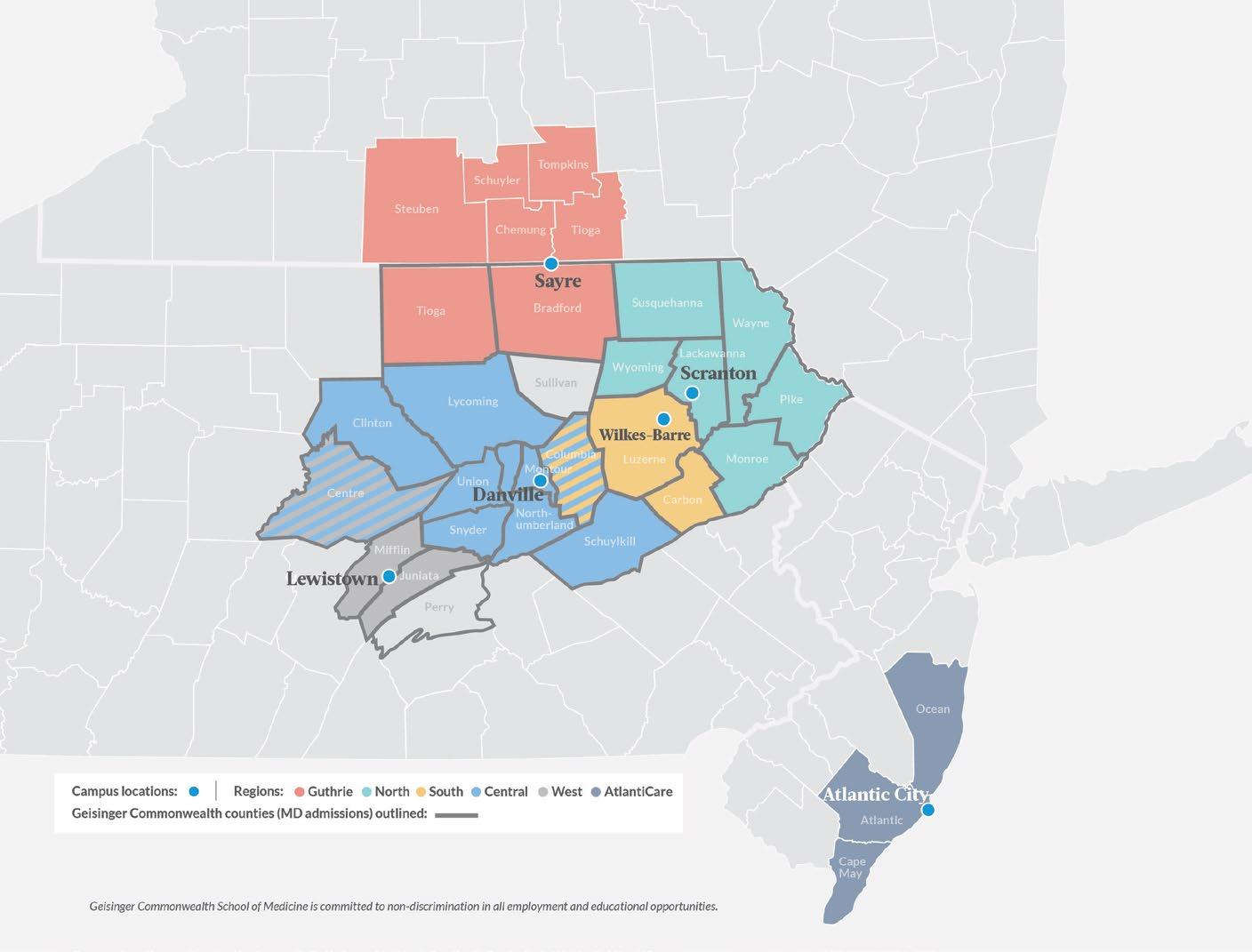

Medical students at Geisinger Commonwealth complete their clinical training at their assigned regional campus.
Each campus offers:
• Exposure to urban and rural settings, allowing abundant, diverse clinical experiences.
• Outstanding clinical partners thanks to affiliation agreements with several hospitals and healthcare systems, as well as physicians and health professionals in private practice, community health centers and other sites throughout our region.
• Well-developed research capabilities.
To explore our regional campuses, visit: go.geisinger.edu/gcsomregionalcampuses
Approximately 2,200 physicians and healthcare professionals in northeastern and central Pennsylvania, southern New York and southern New Jersey serve as Geisinger Commonwealth clinical faculty members.
We follow the well-known adage “it takes a village” by offering students a ready-made “village” of faculty, interprofessional staff and peers within the larger school community that engages students and their personal and professional identity formation.
As a system, Geisinger has devoted significant resources to examining the unique health needs of the communities it serves and proposing novel solutions that can be applied locally but transferred globally.
Our impact is felt economically (Geisinger has an annual $8+ billion positive impact on Pennsylvania’s economy), but more importantly, it’s felt in the ways our presence uplifts our neighbors and improves the region’s quality of life through initiatives like:
• REACH-HEI (Regional Education Academy for Careers in Health – Higher Education Initiative), an out-of-school experience that provides academic enrichment opportunities for students who are economically disadvantaged or underrepresented in medicine.

• Fresh Food Farmacy, serving patients with Type 2 diabetes (and their household) with enough
healthy food to make 10 nutritious meals each week — and a clinical care team that moves them toward better health.
• 65 Forward, primary care designed exclusively for patients 65 and older, featuring more time with physicians, social and educational activities and all ancillary services offered under one roof.
• Family and Community Centered Experience, which incorporates longitudinal service learning, verbal and written reflections, and participation in existing Geisinger community outreach and wellness initiatives, all while engaging and partnering with the community to identify and address community priorities.
The medical student/resident relationship is mutually enriching. Residents and fellows teach and mentor, and medical students benefit from seeing what residency/fellowship is really like.
Geisinger has more than 600 residents and fellows, comprising 40 accredited residency programs and 31 subspecialty fellowship programs, which encompass Accreditation Council for Graduate Medical Education physician programs, as well as dental, podiatry, pharmacy and others.
With two published papers, an oral presentation and a summer working with a Los Angeles spine surgeon, Stephan Aynaszyan got more from Geisinger Commonwealth Medical Research Honors Program than he anticipated when he started two years ago.
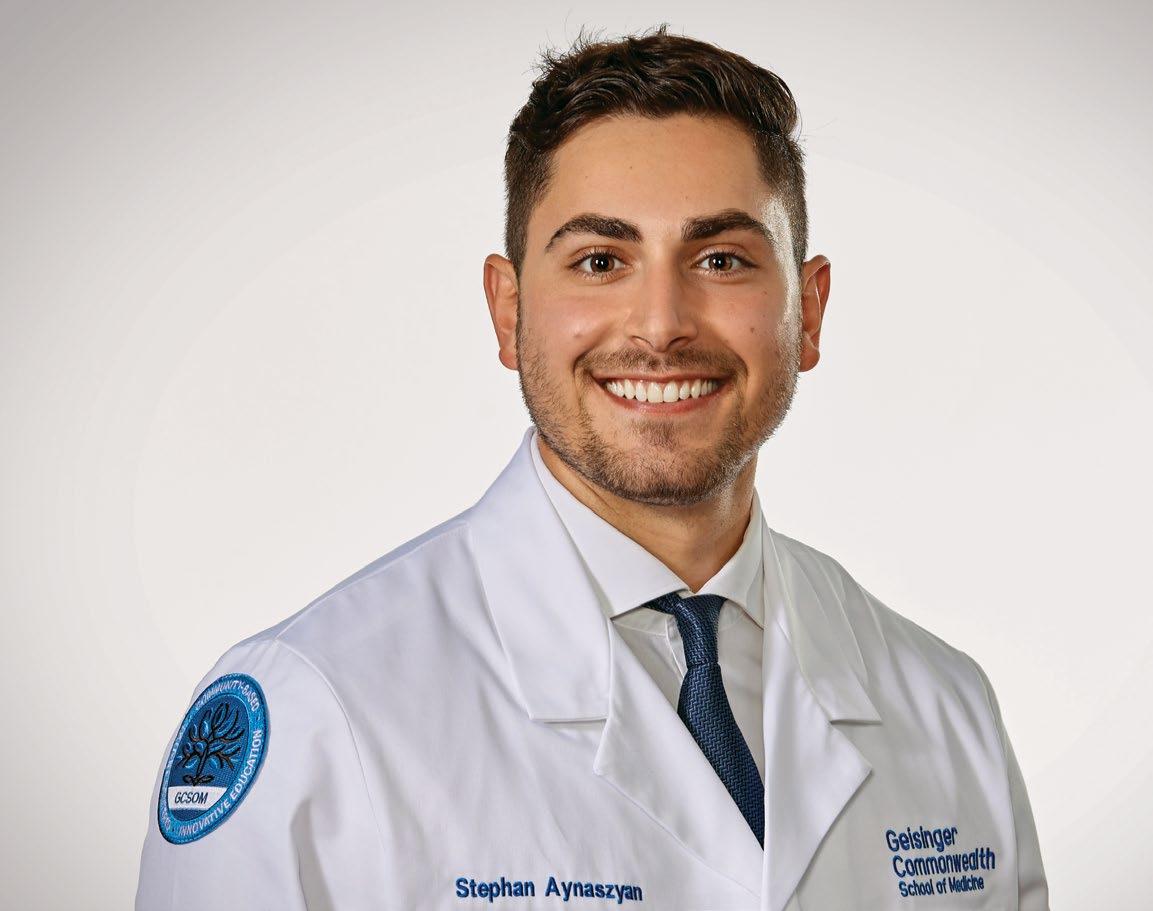
“My honors thesis focuses on imaging and nuances with bone quality assessment,” Mr. Aynaszyan said.
“My first paper was published in Scholarly Research in Progress and then by the North American Spine Society Journal. More recently I had a paper published in The Spine Journal, the top spine journal in the world.” In June, Mr. Aynaszyan also gave an oral presentation of his paper published in The Spine Journal in Las Vegas at the Global Spine Congress. “All this work falls under the umbrella of imaging and what is the most optimal way of assessing bone density — an important assessment surgeons need to make before planning spine surgery,” he said.
Mr. Aynaszyan began his research as a first-year medical student under the mentorship of Geisinger
orthopaedic surgeon Edward DelSole, MD. “I had a strong interest in orthopaedics coming into medical school. I like the idea of being able to relieve 20 years of pain by the work of my hands — it’s instant gratification,” Mr. Aynaszyan said. “Working with Dr. DelSole solidified my decision to pursue orthopaedics. It’s great to have a relationship with him. He really wants students to succeed. He tells us, ‘I want you to go wherever you want to go. Wherever that is, we’re going to get you there.’”
Mr. Aynaszyan has been meeting the extra demands of the Medical Research Honors Program because he knows his chosen field is competitive in terms of residency programs. But he’s come to appreciate and enjoy the research itself. “I’ve been gaining more knowledge in statistical analysis, study design and the clinical aspect of research. And working with Dr. DelSole made it even more enjoyable. This program will help me to be a better candidate for residency — it just made sense to do the Honors Program.”
Geisinger Commonwealth students have many opportunities to engage in research and scholarship throughout their education. The Office of Research and Scholarship offers short- and long-term research programs, like the Summer Research Immersion Program (SRIP) and the Medical Research Honors Program (MRHP). In addition, SRIP gives stipends to 65 preclinical students to engage in summer research each year. Projects are conducted over eight weeks in the summer after the first year of medical school.
Throughout SRIP, students work directly with a faculty mentor and a research team on specific projects that include scientific research aimed at improving health in the laboratory setting or in a community setting, doing public health, community and clinical research that solve problems like access to care. As part of SRIP, students must submit an abstract and share their research findings with the community as an oral or poster presentation at the Summer Research Symposium.
MRHP is a long-term research program that advances a student’s fundamental scientific

knowledge, refines their scholarly communication and fosters a mindset of lifelong learning. Program participants submit a research project proposal, write a thesis and deliver an oral defense to complete the 4-year program. The research experience is guided by a research mentor, a thesis advisory committee and the program manager. Additionally, students write abstracts, present posters and publish findings while building their thesis defense. Participating students who meet all program requirements will graduate with an honors distinction.
Students are provided multiple occasions to present and publish their research findings, including presenting at the annual Spring Research Symposium or submitting their scholarly and creative work for publication in Geisinger Commonwealth’s Journal for Scholarly Research in Progress (SCRIP). This journal is published annually in both print and online mediums and is edited and produced with the assistance of student editors engaged in the editorial process.
go.geisinger.edu/res
Geisinger’s research theme is to personalize healthcare by discovering ways to empower doctors to discern differences in patients — genetic, environmental or social — that impact quality and outcomes. Anchoring this theme is the MyCode® Community Health Initiative, a systemwide biobank storing blood and other samples for research use. MyCode analyzes the DNA of volunteers and has surpassed its latest goal of 250,000 participants.
Researchers use this vast body of data to transform knowledge of the genome into powerful intelligence that is personally relevant to individual patients. MyCode research has already been translated into ways to diagnose certain medical conditions earlier, even before symptoms appear, and to implement new treatments or medications to manage them.

When he was growing up in Baltimore, Nelson Sofoluke, MD, loved computers. Delving into the mechanics behind what made a program run appealed to his curiosity and he was delighted by seeing immediate responses when he tweaked a program. In fact, he was fairly certain he was going to have a career in computers — right up until his junior year at the University of Maryland when he had a neuroscience course. That course sparked his deep fascination with the brain and the ways surgeons can revive lost function by fixing the brain or nervous system.
“When I began to think about medicine, I felt that I would be choosing to do all of the things I loved most — solving problems, thinking critically, being a detective,” he said. Since Dr. Sofoluke’s call to become a surgeon came late in his college career, he began to look for master’s degree programs where he could get the basic science prerequisites necessary to apply to medical school. “The Master of Biomedical Sciences program was my introduction to Geisinger Commonwealth School of Medicine,” he said. “I chose it because I liked the community — it was small and I felt at home there. The school was so integrated with the community that I instantly felt a part of it.”
As a medical student interested in the highly competitive field of neurosurgery, Dr. Sofoluke said the School of Medicine’s longitudinal integrated curriculum in his third year gave him an important advantage. “Because of the inpatient/outpatient combination, I was in the operating room every week — straight block rotations wouldn’t have allowed that. I was able to have that repetition with the instruments and gained skill with my hands,” he said. “And I had very good teachers. That experience gave me a lot of confidence that helped a lot when I started residency.”
Now in his sixth year of a seven-year residency at Geisinger, Dr. Sofoluke says working in the OR is fulfilling his dreams. “Neurosurgery has very high rewards because the risk is so great. When someone has a deficit and the surgery fixes it and function returns, the reward you feel is amazing. But I also think of how wrong things can go, so when patients trust you to touch them despite that risk, it’s humbling. Sometimes it’s nerve-wracking, but it’s always humbling.”

Taking a holistic approach to total health, Geisinger Commonwealth School of Medicine offers a wealth of resources for students in regard to every aspect — or domain — that contributes to a person’s sense of well-being, physical, emotional, social, spiritual, intellectual, occupational, environmental and financial.

Student Health Services (SHS): SHS minimizes health-related barriers to learning. The SHS office staff and website provide information and referral to urgent care, primary and specialty care, health insurance and credentialing. SHS mental health and counseling case management provides consultation and referral as needed to teletherapy and local providers.
TimelyCare: A digital solution that offers on-demand 24/7 access to mental health and medical care and a diverse, culturally competent provider network. Services include scheduled counseling, health coaching, yoga, meditation and self-care resources.
Center for Student Life and Wellness: Coordination of wellness and engagement resources and programming through partnership with students. The center oversees wellness programs and supports over 75 student clubs and organizations that serve students’ personal, professional and community engagement interests. It also includes the following dedicated spaces: fitness, recreation and relaxation space; multi-cultural center; meditation and prayer room; student government offices; kitchenette; student lounge.
Geisinger Peer Support: Peer Navigators are a student-led group that supports students in addressing academic stress, interpersonal conflicts, imposter syndrome, feelings of isolation and general mental health concerns.

CARE Team: The CARE Team provides support and referral services to students experiencing stress. By partnering with members of the community, the CARE Team strives to promote individual well-being and success while prioritizing community safety.
Mental Health First Aid (MHFA): MHFA is a course designed to give members of the public key skills to help someone who is developing a mental health problem or having a mental health crisis.


The

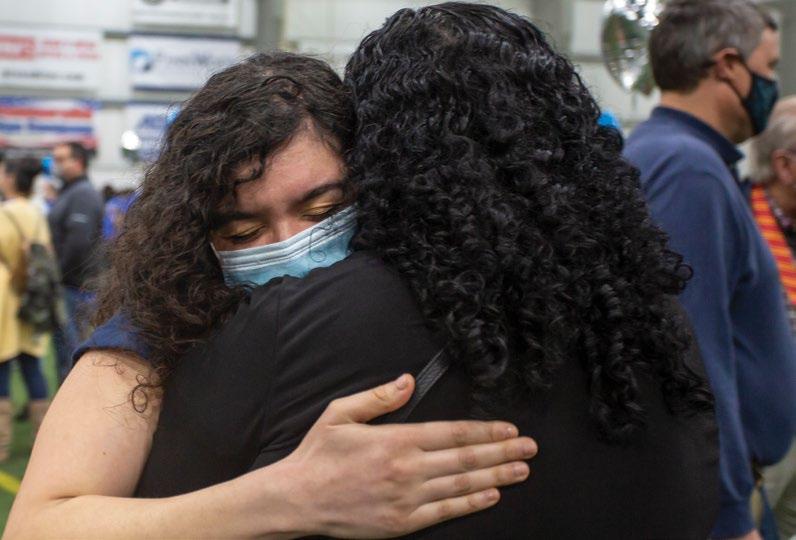
An abundance of resources ensure our students make the best residency match possible. Geisinger Commonwealth’s collaborative coaching model is intensive and effective. The process begins in the first-year Orientation course and continues to evolve every year with a combination of centrally provided content and individual processing opportunities. As students progress, collaborative team meetings are held weekly to guide students through the application and interview season. National and institutional match data is used to ensure students successfully gain interviews and ultimately match to a residency program that best fits with their values, skills and attributes. Students receive strategic coaching regarding the application submission and alumni provide peer mentoring, as needed.
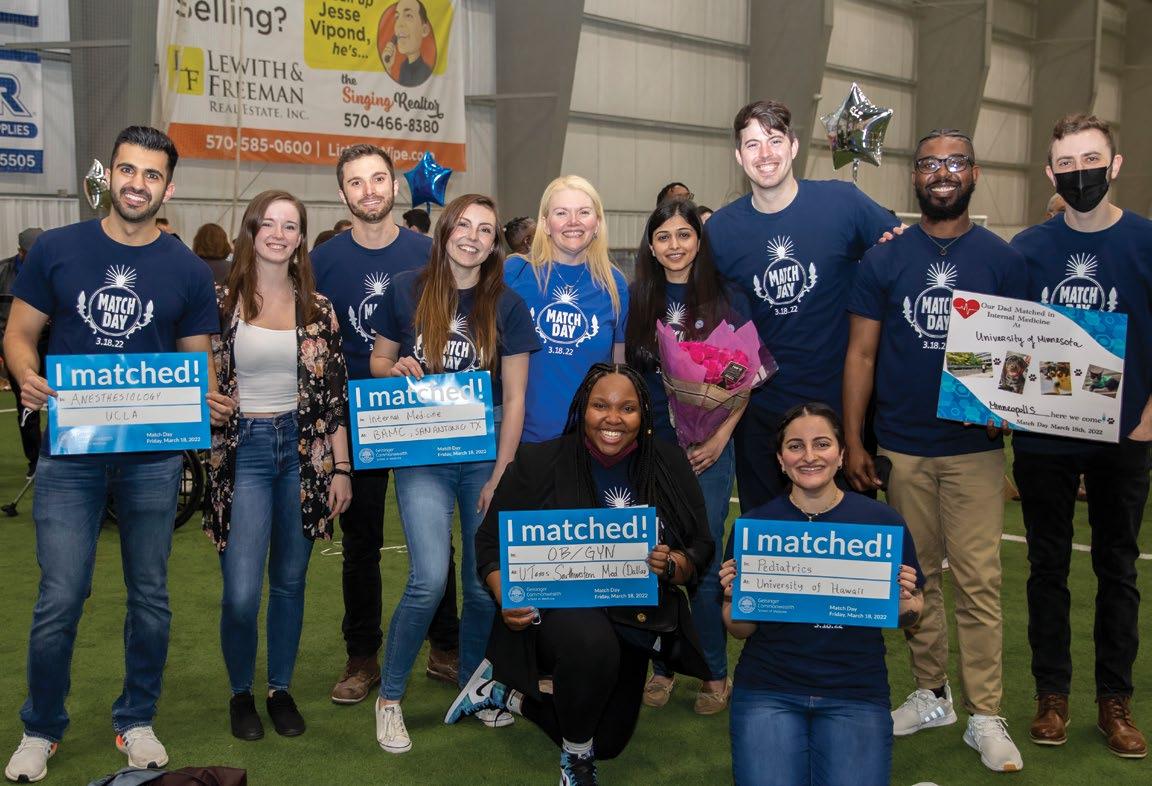

Geisinger Commonwealth medical students participated in the match experience hosted by the National Resident Matching Program. Students interviewed across the country with residency programs in a wide range of specialties and programs.
• Allegheny General Hospital, PA
• MedStar Georgetown University Hospital, DC
• Penn State Hershey Medical Center, PA
• Stony Brook Teach Hospital, NY
• UCLA Medical Center, CA
• University of Rochester/Strong Memorial, NY
• Ascension St. John Hospital, MI
• Baylor Scott & White Medical Center, TX
• CMSRU/Cooper University Hospital, NJ
• Crozer-Chester Medical Center, PA
• Eastern Virginia Medical School, VA
• Temple University Hospital, PA
• Thomas Jefferson University, PA
• University of Virginia, VA
• Virginia Commonwealth University Health System, VA
• WellSpan Health York Hospital, PA
• Yale-New Haven Hospital, CT
• Zucker School of Medicine-Northwell NS/LIJ, NY
• Abington Memorial Hospital, PA
• Concord Hospital, NH
• Oregon Health & Science University, OR
• St. Luke’s Hospital System, PA
• UPMC St. Margaret, PA
• WellSpan Health Hospital System, PA
• Beaumont Health, MI
• Christiana Care, DE
• CMSRU/Cooper University Hospital, NJ
• Crozer-Chester Medical Center, PA
• Geisinger, PA
• Temple University Hospital, PA
• Walter Reed National Military Medical Center, MD
• WellSpan Health Hospital System, PA
• Albert Einstein Medical Center, PA
• Amita St. Joseph Hospital, IL
• Brown University/Rhode Island Hospital, RI
• Carolinas Medical Center, NC
• Case Western/University Hospital Cleveland Medical Center, OH
• Cleveland Clinic Foundation Medical Center, OH
• Geisinger, PA
• HCA Healthcare/TriStar Nashville, TN
• Lehigh Valley Hospital, PA
• NYU Long Island School of Medicine, NY
• Penn State Hershey Medical Center, PA
• Riverside Community Hospital, CA
• San Antonio Military Medical Center, TX
• St. Luke’s Hospital System, PA
• UC Davis Medical Center, CA
• University of Michigan Hospital, MI
• University of Minnesota Medical School, MN
• University of Texas Medical Branch, TX
• WellSpan Health Hospital, PA
• Zucker School of Medicine-Northwell NS/LIJ, NY
• Albany Medical Center, NY
• New York Presbyterian Hospital-Weill Cornell Medical Center, NY
• University of Rochester/Strong Memorial, NY
• Case Western/University Hospital Cleveland Medical Center, OH
• Geisinger, PA
• Prisma Health University of SC School of Medicine, SC
• Lankenau Medical Center, PA
• New Hanover Regional Medical Center, NC
• Yale-New Haven Hospital, CT
• CMSRU/Cooper University Hospital, NJ
• Lankenau Medical Center, PA
• Duke Univ Medical Center, NC
• ISMMS Mount Sinai Beth Israel, NY
• Mayo Clinic School of Graduate Medical Education, AZ
• University of Connecticut School of Medicine, CT
• University of Rochester/Strong Memorial, NY
• Barnes-Jewish Hospital, MO
• CMSRU/Cooper University Hospital, NJ
• Lankenau Medical Center, PA
• Madigan Army Medical Center, WA
• University of Rochester/Strong Memorial, NY
• University of Texas Southwestern Medical School, TX
• Geisinger, PA
• Penn State Hershey Medical Center, PA
• UPMC Hamot Medical Center, PA
• Geisinger, PA
• University of Cincinnati Medical Center, OH
Pediatrics
• Jefferson Medical College/DuPont Children’s, PA
• Johns Hopkins All Children’s Hospital, FL
• NYP Hospital-Weill Cornell Medical Center, NY
• University of Hawaii, HI
• University of Rochester/Strong Memorial, NY
• Yale-New Haven Hospital, CT
• Zucker School of Medicine-Northwell Cohen Children’s Hospital, NY
• Lehigh Valley Hospital, PA
• Penn Highlands Healthcare, PA
• Penn State Hershey Medical Center, PA
• Richmond University Medical Center, NY
• St. Elizabeth’s Hospital/DBH, CC
• UCLA Semel Institute for Neuroscience, CA
• University of Texas at Austin Dell Medical School, TX
• Wright Center for GME, PA
• David Grant Medical Center in Fairfield, CA
• Geisinger, PA
• University of California, Irvine, CA
• Geisinger, PA
• Guthrie/Robert Packer Hospital, PA
• Stony Brook Teaching Hospital, NY
• Temple University Hospital, PA
• UMass Chan Medical School. MA
• University of North Carolina Hospitals, NC
Transitional
• St. Luke’s Hospital-Anderson, PA
• University of Tennessee Graduate School of Medicine, TN
Geisinger believes that the future of medicine lies in robust primary care — care that anticipates and prevents disease, focuses on wellness and recognizes mental health and well-being as fundamental to stronger, more resilient communities. That’s why the Abigail Geisinger Scholars Program focuses on the following specialties:
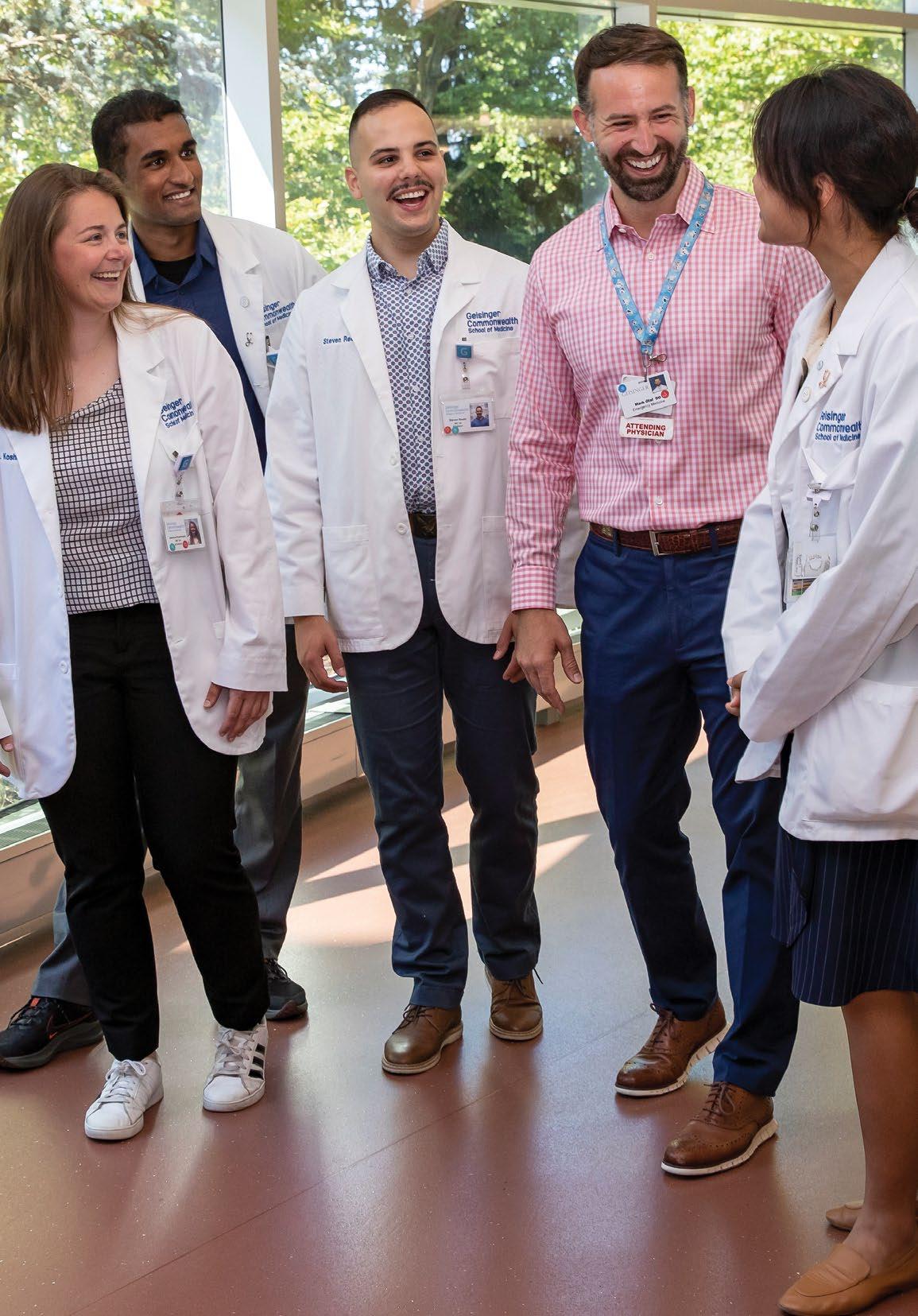
• Family medicine
• Internal medicine
• Medicine-pediatrics
• Psychiatry
Our scholars program frees medical students from the financial concerns that often derail their dreams. Abigail Geisinger Scholars will:
• Graduate without tuition debt
• Receive a $2,000 per month stipend
• Become a Geisinger-employed physician in one of the specialties listed above upon completion of residency training. One year of service equals one year of support, with a two-year minimum.
Interested in applying?
Submit an American Medical College Application Service® (AMCAS®) primary application and Geisinger Commonwealth secondary application.
• Answer “yes” to the first question on the Geisinger Commonwealth secondary application regarding interest in applying for the Abigail Geisinger Scholars Program.
• Complete the question regarding primary care or psychiatry and provide any updates to your experiences that align with the Abigail Geisinger Scholars Program.
Students are selected to participate in this program based on the following criteria: financial need, merit, diversity and likelihood of staying at Geisinger beyond the service obligation. Students not selected for the Abigail Geisinger Scholars Program will also be considered for regular admission into the MD program.
To learn more, visit geisinger.edu/abigailscholars.
Acceptance into the accelerated three-year MD program comes with a directed pathway into our residency program of your medical school training. Upon meeting the academic and professional standards for graduation from medical school, you’ll be ranked to match into one of the following residency programs through the National Resident Matching Program. If you choose to rank us, you’d be positioned to match at the residency of your medical school training.
• Family Medicine Residency at Geisinger Lewistown Hospital in our West Campus
• Kistler Family Medicine Residency at Geisinger South Wilkes-Barre in our South Campus
• Internal Medicine Residency at Geisinger Wyoming Valley Medical Center in our South Campus
• Early immersion/orientation with staff/faculty and our residency programs
• Longitudinal Clinical Experience (LCE) at participating residencies early in the curriculum

• Scholarly summer immersion program with participating residencies
• Longitudinal integrated clerkship (LIC) during clerkship in either Family Medicine or Internal Medicine
• Medical school completion in 3 years
• Rigorous programing aimed for time efficiency and robust experiences
• Advising and mentoring by primary care physicians and residents
• Peer collaboration and fellowship
• Direct progression into residency
Students seeking admission to Geisinger Commonwealth’s MD program must:
1. Complete the following premedical course requirements in good standing:

General biology with laboratory (1 year/2 semesters)
General inorganic chemistry with laboratory (1 year/2 semesters)
Organic chemistry with laboratory (1 year/2 semesters)
General physics with laboratory (1 year/2 semesters)
English and English composition (1 semester)
Online coursework will not be accepted.
All pre-requisite course grades must be passing.
2. Be a U.S. citizen or permanent resident of the United States at time of application.
3. Have received their bachelor’s degree from an accredited U.S. or Canadian institution prior to matriculation.
4. The student must complete all required criminal background checks and drug screens. Once a student is accepted to Geisinger Commonwealth, Certiphi Screening Inc. will contact the student via email about the criminal background check process. The following checks are required by July 1 of the matriculating year: Criminal Background Check, Child Abuse History, Pennsylvania Access to Criminal History and FBI fingerprinting. Furthermore, applicants accepted to Geisinger Commonwealth must submit and satisfactorily complete a drug screening prior to matriculation and within the timeframe designated by the Office of Admissions.
Geisinger Commonwealth’s Policy on Criminal Background Check and Drug Screening can be found here: go.geisinger.edu/backgrounddrugscreening.
5. Any legal or academic actions taken against the student from the time of application submission to AMCAS and matriculation at Geisinger Commonwealth must be reported to the Admissions Office at Geisinger Commonwealth by the student.
6. The student’s attendance at Geisinger Commonwealth’s orientation program is mandatory.
7. The student must meet Geisinger Commonwealth’s Technical Standards with or without a reasonable accommodation. Any student with a disability must provide medical documentation detailing the disability and the type of accommodation needed to meet Geisinger Commonwealth’s Technical Standards.
Depending on the need for the accommodation, the Accessibilities Committee will review the information supplied by the student to determine their ability to meet the Geisinger Commonwealth’s Technical Standards with reasonable accommodations.
It is the student’s responsibility to ensure they have met all of the above requirements. Failure to do so may result in the rescinding of the admission offer.
Students interested in applying to Geisinger Commonwealth’s MD program should:
1. Complete an application through the online American Medical College Application Service (AMCAS), the national application for U.S. MD programs.
• AMCAS application completion includes an application fee and all supporting documents as requested.
• Geisinger Commonwealth will only consider verified AMCAS applications (incomplete applications will not be reviewed).
2. Submit letters of recommendation via AMCAS Letters.
• All applicants are required to submit one pre-professional/pre-health/committee letter or three evaluation/recommendation letters from faculty who are familiar with the applicant’s career goals and academic coursework.
• The admissions committee will consider additional letters that highlight and support facets of an applicant’s application portfolio not previously addressed and are submitted via the AMCAS Letter Service.
• For non-traditional students, the admissions committee will consider letters of recommendation written by individuals who have firsthand knowledge of the candidate’s strengths, work ethic, abilities and commitment to the field of medicine.
3. Complete the Geisinger Commonwealth Secondary Application.
• All AMCAS verified applicants will automatically receive a secondary application.
• Application fee is $100.
• Candidates in receipt of an AMCAS Fee Assistance Program (FAP) waiver may submit a PDF copy of the form to admissions@som. geisinger.edu.
4. Take the Association of American Medical Colleges (AAMC) PREview™ Professional Readiness Exam.
• GCSOM is strongly encouraging applicants to take the AAMC PREview™ exam. We will consider scores as one part of our admissions process.
After a review of the application materials, students are notified if they have been offered an interview for the MD program. All candidates will interview using the Multiple Mini Interview (MMI) format.
Call: 570-504-9068 Text: 570-904-2084 admissions@som.geisinger.edu geisinger.edu/gcsom
570-504-9068
570-904-2084

